Kyrgyzstan
From the glaciated peaks of the Tian Shan mountains through desert canyons and steppes to the high pastures of Song Kul Lake. The mountain passes of the Terskey Alatoo, the arid surroundings of Lake Issyk-Kul and the rounded, welcoming hills to the south at Naryn. Kyrgyzstan offers a diverse landscape complemented by herds of semi-wild horses and traditional yurts. It is undoubtedly one of the most diverse countries in Central Asia and perhaps in the world.
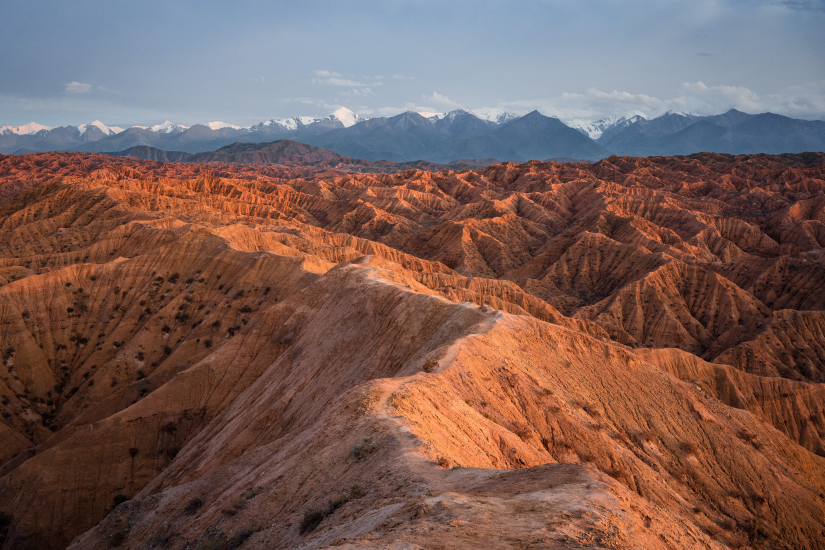
If any place in Kyrgyzstan is truly surprising, it is the vast canyons of the "forgotten rivers". Here, the sandy, rolling landscape stretches to the horizon in an endless series of ridges. The desert landscape alone would be absolutely stunning, but the horizon is dominated by the glaciated ridge of the Tian-Shan mountains, which rises high above the canyons.
Canyons of the forgotten rivers
If any place in Kyrgyzstan is truly surprising, it is the vast canyons of the "forgotten rivers". Here, the sandy, rolling landscape stretches to the horizon in an endless series of ridges. The desert landscape alone would be absolutely stunning, but the horizon is dominated by the glaciated ridge of the Tian-Shan mountains, which rises high above the canyons.
- Camera used: SONY ILCE-7C
- Exposure time: 1/50 s
- Aperture: f/9.0
- Focal length: 35mm
- ISO: 100
- Date taken: Jun 29, 2023 14:51:31
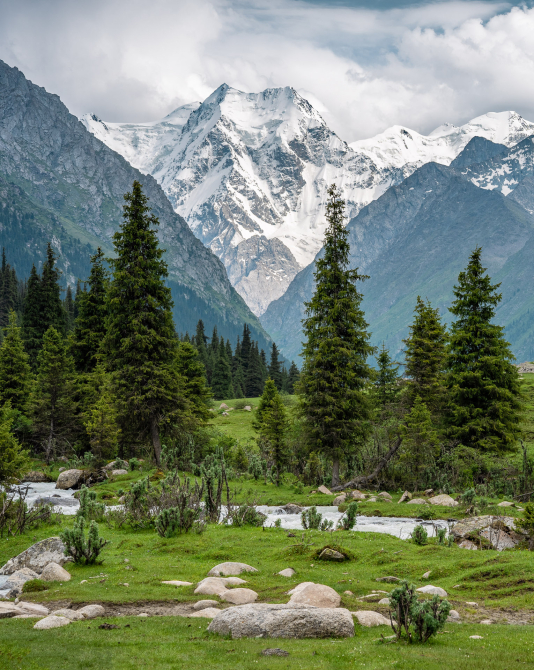
The end of the Djety Oguz valley is dominated by Mount Oguz Bashi (formerly known as Yeltsin's Peak), whose name literally means "head of the bull". The five-thousand-foot mountain actually resembles a bull's horns with its two peaks. When the forest parts and a snow-covered wall rises above the shoulders of the wild river, a view that perfectly describes the Kyrgyz mountains appears.
Oguz Bashi
The end of the Djety Oguz valley is dominated by Mount Oguz Bashi (formerly known as Yeltsin's Peak), whose name literally means "head of the bull". The five-thousand-foot mountain actually resembles a bull's horns with its two peaks. When the forest parts and a snow-covered wall rises above the shoulders of the wild river, a view that perfectly describes the Kyrgyz mountains appears.
- Camera used: SONY ILCE-7C
- Exposure time: 1/500 s
- Aperture: f/8.0
- Focal length: 90mm
- ISO: 100
- Date taken: Jun 25, 2023 11:52:51
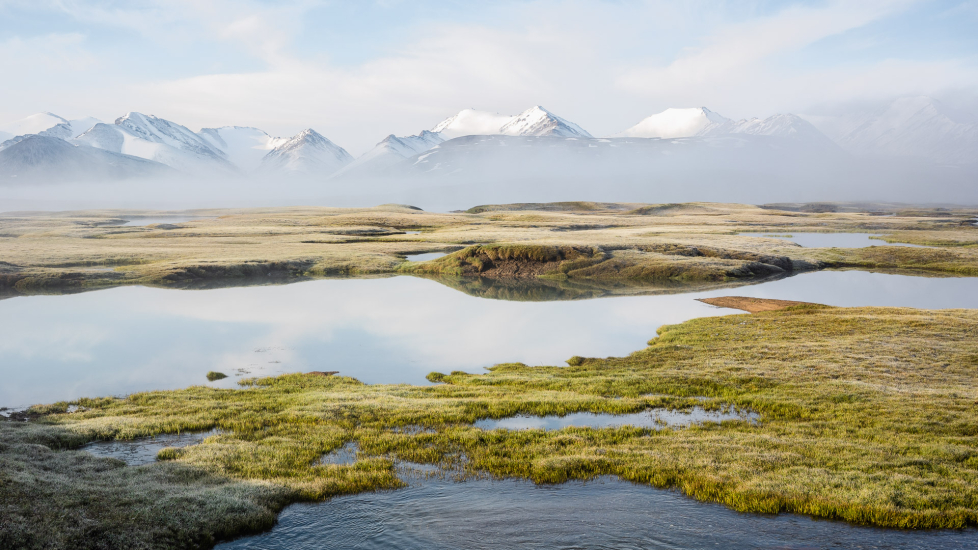
Long after sunrise, the landscape around Arabel Suu takes on the true feel I imagined before. The golden, rust-covered grassy plains between the twisted banks of lakes and streams suddenly emerge from the mist. The gradually disappearing fog eventually reveals the snow-capped peaks in the background, which appear at first as faint phantoms against the bright sky.
Mists of the Heavenly Mountains
Long after sunrise, the landscape around Arabel Suu takes on the true feel I imagined before. The golden, rust-covered grassy plains between the twisted banks of lakes and streams suddenly emerge from the mist. The gradually disappearing fog eventually reveals the snow-capped peaks in the background, which appear at first as faint phantoms against the bright sky.
- Camera used: SONY ILCE-7C
- Exposure time: 1/160 s
- Aperture: f/8.0
- Focal length: 35mm
- ISO: 100
- Date taken: Jul 4, 2023 01:33:57
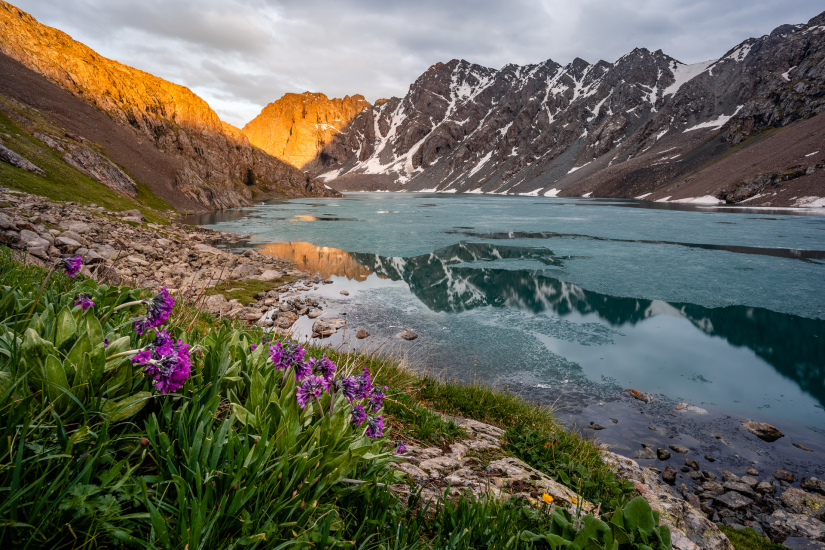
For a long time it looks like the evening at the pearl of Kyrgyzstan, the mountain lake Ala Kul, will be cloudy. On the way up there we are delayed by a storm that uncompromisingly clouds the whole sky and the landscape darkens dramatically. It is only at the very end of the day that the clouds partly part and the opposite rocky slopes are illuminated by the orange light of the setting sun. Above the frozen surface of the lake, I look for a suitable composition until I find a few clusters of purple blooming flowers that give the photo some depth.
Ala Kul lake
For a long time it looks like the evening at the pearl of Kyrgyzstan, the mountain lake Ala Kul, will be cloudy. On the way up there we are delayed by a storm that uncompromisingly clouds the whole sky and the landscape darkens dramatically. It is only at the very end of the day that the clouds partly part and the opposite rocky slopes are illuminated by the orange light of the setting sun. Above the frozen surface of the lake, I look for a suitable composition until I find a few clusters of purple blooming flowers that give the photo some depth.
- Camera used: SONY ILCE-7C
- Exposure time: 1/8 s
- Aperture: f/16.0
- Focal length: 20mm
- ISO: 100
- Date taken: Jun 27, 2023 14:58:27
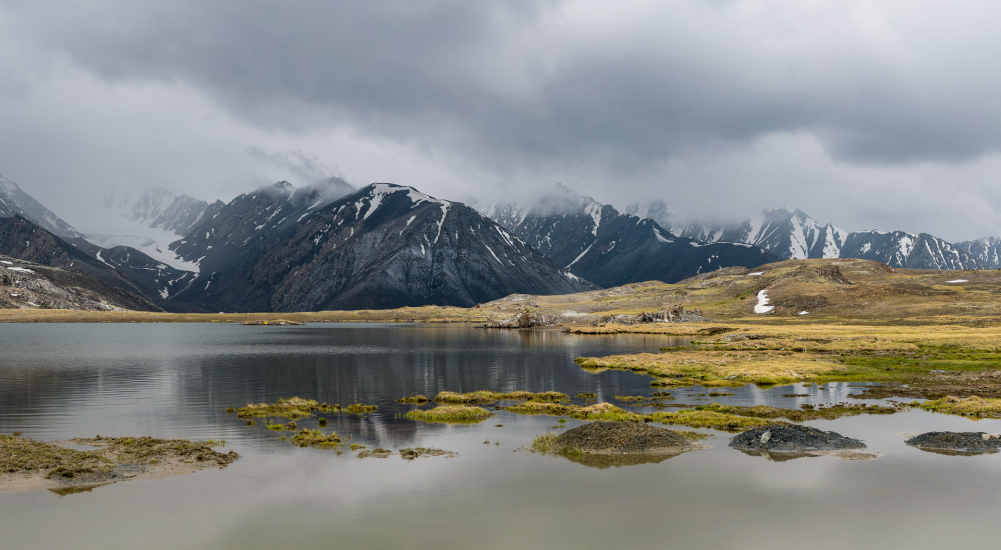
Heavy cloud cover coming to the Heavenly Mountains. The cold waters of Lake Arabel, 3,800 metres above sea level, reflect the black slopes rising above the Burkhan Valley. It doesn't take long for the mountains to disappear in a grey curtain that is inexorably approaching, hails falling and thunder rumbling. After the snowstorm passes, the surrounding peaks are covered in fresh snow.
Lake Arabel
Heavy cloud cover coming to the Heavenly Mountains. The cold waters of Lake Arabel, 3,800 metres above sea level, reflect the black slopes rising above the Burkhan Valley. It doesn't take long for the mountains to disappear in a grey curtain that is inexorably approaching, hails falling and thunder rumbling. After the snowstorm passes, the surrounding peaks are covered in fresh snow.
- Camera used: SONY ILCE-7C
- Exposure time: 1/30 s
- Aperture: f/8.0
- Focal length: 35mm
- ISO: 100
- Date taken: Jul 3, 2023 13:37:39
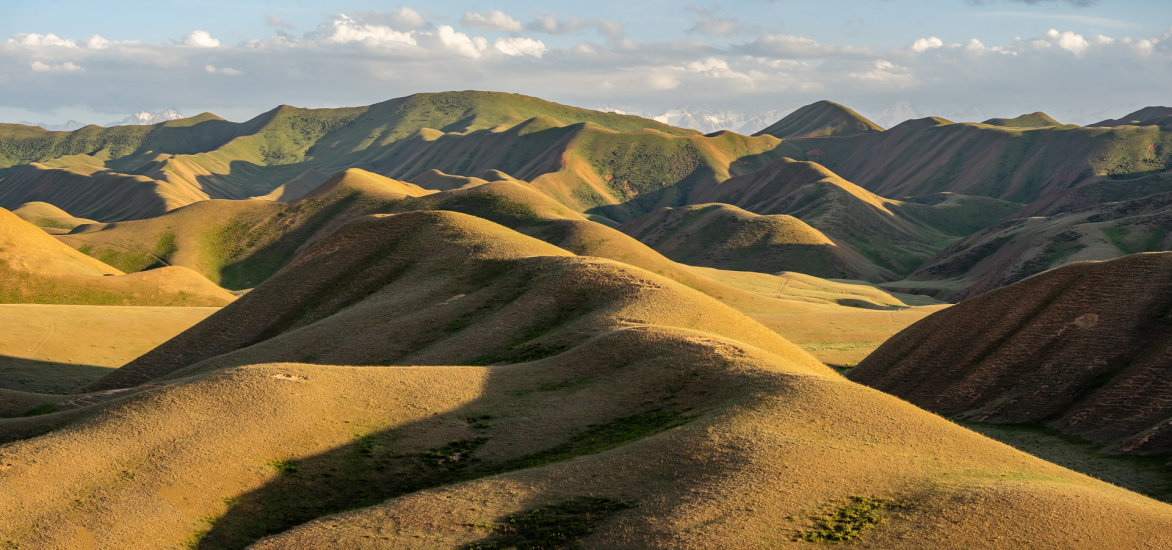
The endless rounded pastures around Naryn stretch in all directions to the horizon. Only in the south are they surmounted by the glaciated At-Bashi range, rising timidly above the low hills. From here it is not far to the Chinese border. The seemingly friendly face of the grasslands is marred by the ubiquitous carcasses and skulls of animals and stern-looking herdsmen who emerge here and there from the chaotic tangle of valleys.
Rounded pastures
The endless rounded pastures around Naryn stretch in all directions to the horizon. Only in the south are they surmounted by the glaciated At-Bashi range, rising timidly above the low hills. From here it is not far to the Chinese border. The seemingly friendly face of the grasslands is marred by the ubiquitous carcasses and skulls of animals and stern-looking herdsmen who emerge here and there from the chaotic tangle of valleys.
- Camera used: SONY ILCE-7C
- Exposure time: 1/80 s
- Aperture: f/8.0
- Focal length: 90mm
- ISO: 100
- Date taken: Jul 5, 2023 14:38:41
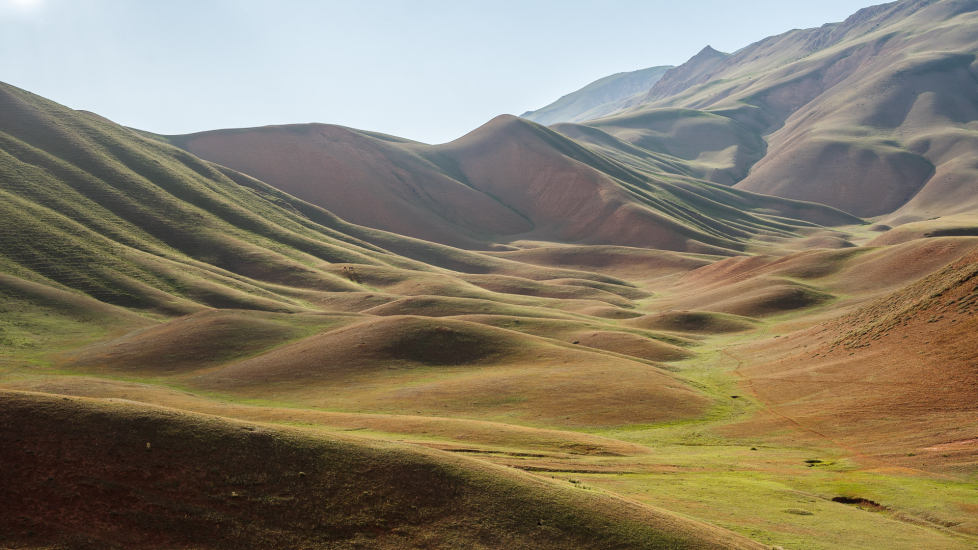
The landscape around Naryn is dominated by the endless rounded hills. The welcoming pastures reveal their full face in the low sun, when the individual contours and the distinctive colours of orange rock and green herbs become apparent. The scale of the landscape only becomes apparent in the presence of horses. Here, too, a pair of grazing horses can be found in the distance.
In the green hills of Naryn
The landscape around Naryn is dominated by the endless rounded hills. The welcoming pastures reveal their full face in the low sun, when the individual contours and the distinctive colours of orange rock and green herbs become apparent. The scale of the landscape only becomes apparent in the presence of horses. Here, too, a pair of grazing horses can be found in the distance.
- Camera used: SONY ILCE-7C
- Exposure time: 1/200 s
- Aperture: f/8.0
- Focal length: 50mm
- ISO: 100
- Date taken: Jul 5, 2023 13:04:21
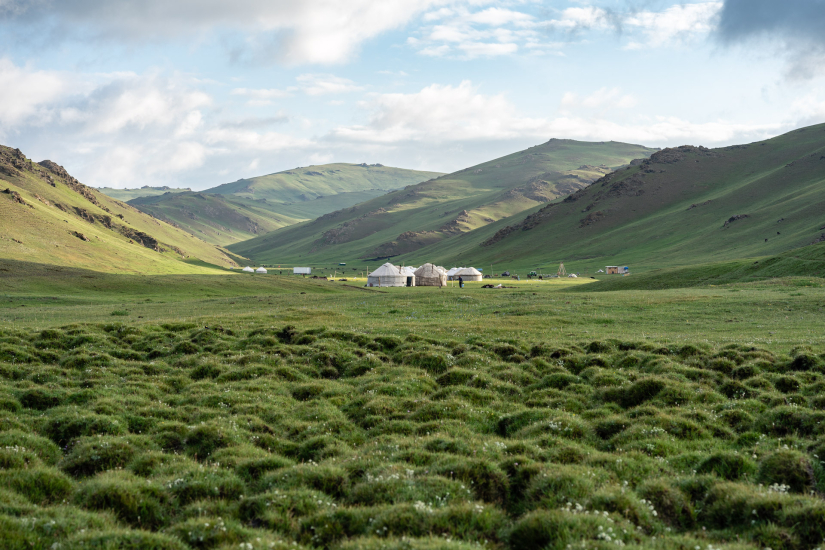
Traditional yurt camps are inseparable from the Kyrgyz landscape. In many places, yurts are already a tourist attraction, but in the wide surroundings of Song Kul Lake, these are a very common way of living for herders. White tents, with smoke rising from them all day long, decorate the valley, and herds of horses, sheep or cows can almost always be found nearby.
Yurts at Song Kul
Traditional yurt camps are inseparable from the Kyrgyz landscape. In many places, yurts are already a tourist attraction, but in the wide surroundings of Song Kul Lake, these are a very common way of living for herders. White tents, with smoke rising from them all day long, decorate the valley, and herds of horses, sheep or cows can almost always be found nearby.
- Camera used: SONY ILCE-7M2
- Exposure time: 1/160 s
- Aperture: f/6.3
- Focal length: 90mm
- ISO: 100
- Date taken: Jul 7, 2023 01:54:09
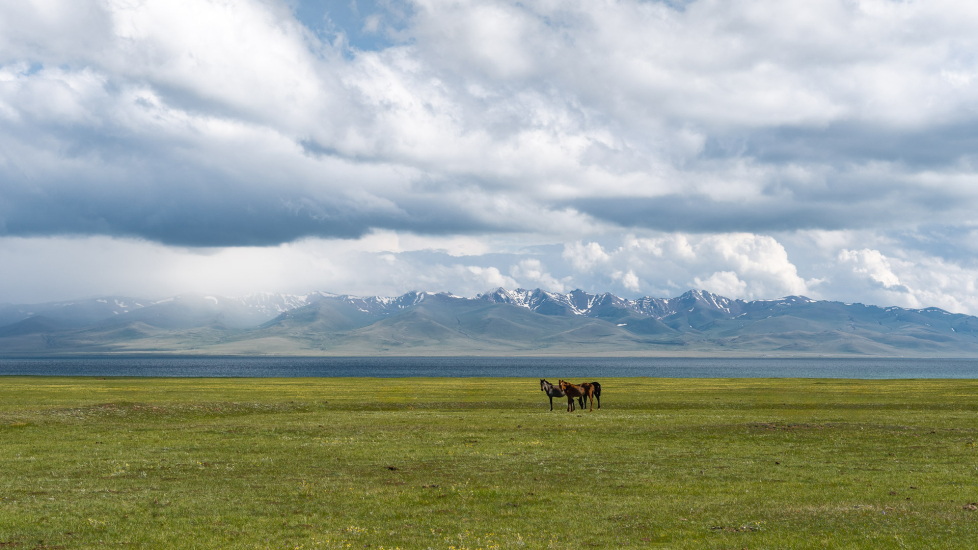
It would be hard to find a more typical landscape of Kyrgyzstan than the shores of Lake Song Kul, situated at an altitude of over 3,000 metres. Grassy plains rising gently to the distant mountains, traditional pastoral life in yurts and free-ranging herds of horses create a unique landscape.
Song Kul
It would be hard to find a more typical landscape of Kyrgyzstan than the shores of Lake Song Kul, situated at an altitude of over 3,000 metres. Grassy plains rising gently to the distant mountains, traditional pastoral life in yurts and free-ranging herds of horses create a unique landscape.
- Camera used: SONY ILCE-7C
- Exposure time: 1/320 s
- Aperture: f/8.0
- Focal length: 50mm
- ISO: 100
- Date taken: Jul 6, 2023 11:48:20
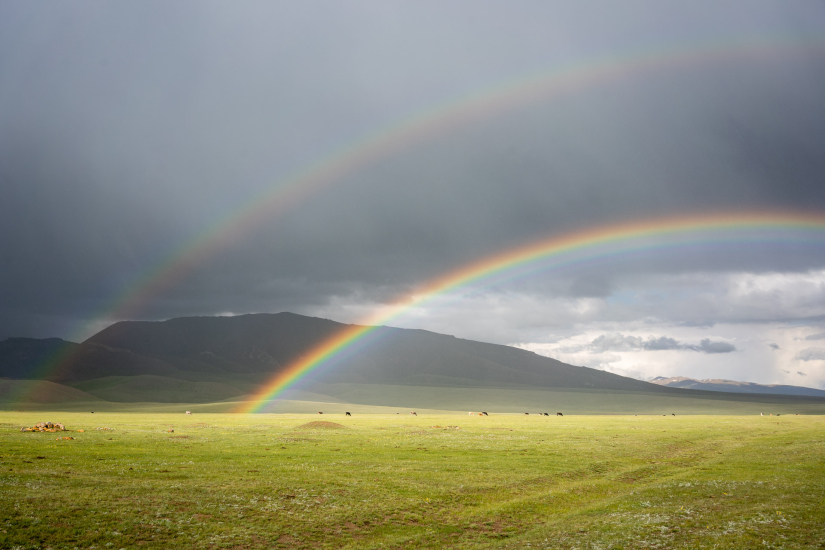
Song Kul Lake and the adjacent plains are so vast that it is possible to watch storms raging on the opposite shores of the lake for hours before they move closer. The departing storms then, thanks to the distant horizons, are often illuminated by the sun and conjure up a magical rainbow spectacle.
Rainbow oveer pastures
Song Kul Lake and the adjacent plains are so vast that it is possible to watch storms raging on the opposite shores of the lake for hours before they move closer. The departing storms then, thanks to the distant horizons, are often illuminated by the sun and conjure up a magical rainbow spectacle.
- Camera used: SONY ILCE-7C
- Exposure time: 1/320 s
- Aperture: f/8.0
- Focal length: 35mm
- ISO: 100
- Date taken: Jul 6, 2023 12:36:12
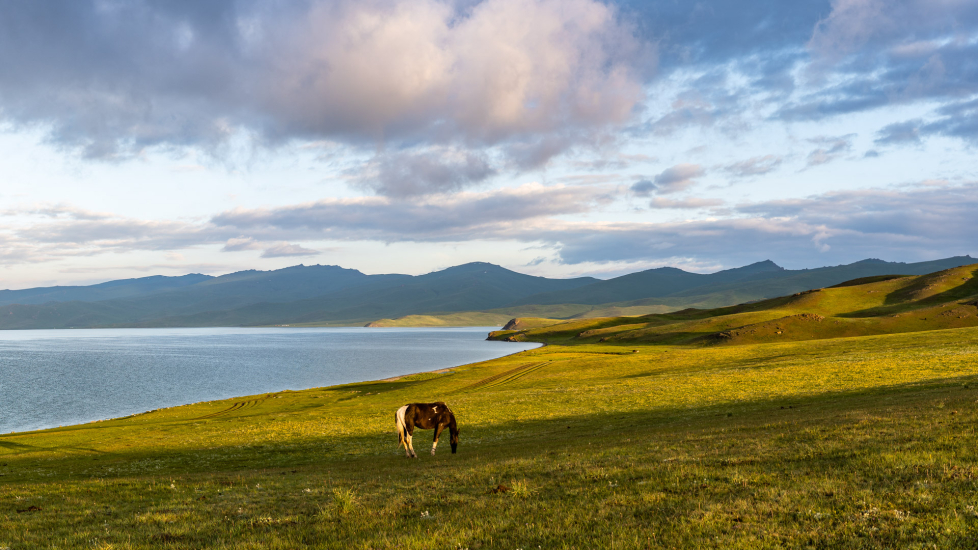
After a rainy night, the pastures on the shores of Song Kul Lake are lit up with a welcoming sun. The landscape takes on a completely different feel, even the distant mountains are visible and not lost in the misty haze. Tt is surprisingly lively around here, the Kyrgyz are already doing the first necessary work by the yurrt camps and the first horses are going out to graze.
Morning by the shores of Song Kul
After a rainy night, the pastures on the shores of Song Kul Lake are lit up with a welcoming sun. The landscape takes on a completely different feel, even the distant mountains are visible and not lost in the misty haze. Tt is surprisingly lively around here, the Kyrgyz are already doing the first necessary work by the yurrt camps and the first horses are going out to graze.
- Camera used: SONY ILCE-7C
- Exposure time: 1/50 s
- Aperture: f/8.0
- Focal length: 50mm
- ISO: 100
- Date taken: Jul 7, 2023 01:00:25
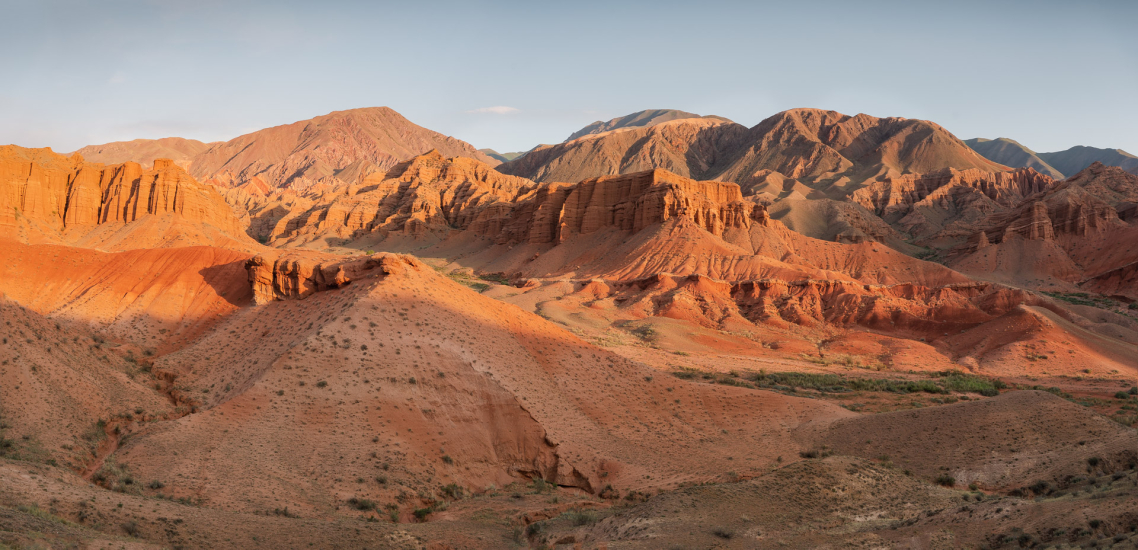
The vast canyons of Konorchek are not to be missed when travelling through Kyrgyzstan. The landscape here is without exaggeration reminiscent of the much more famous canyons of North America. And here? We have the canyons all to ourselves and we can camp freely among the pointed hills. The most impressive thing is of course the sunrise, a bit awkward at first, when the sun hides for a while behind a band of clouds. Eventually, however, it rises a little higher and the canyons light up with incredible colours.
Konorchek
The vast canyons of Konorchek are not to be missed when travelling through Kyrgyzstan. The landscape here is without exaggeration reminiscent of the much more famous canyons of North America. And here? We have the canyons all to ourselves and we can camp freely among the pointed hills. The most impressive thing is of course the sunrise, a bit awkward at first, when the sun hides for a while behind a band of clouds. Eventually, however, it rises a little higher and the canyons light up with incredible colours.
- Camera used: SONY ILCE-7C
- Exposure time: 1/80 s
- Aperture: f/8.0
- Focal length: 35mm
- ISO: 100
- Date taken: Jul 3, 2023 00:57:04
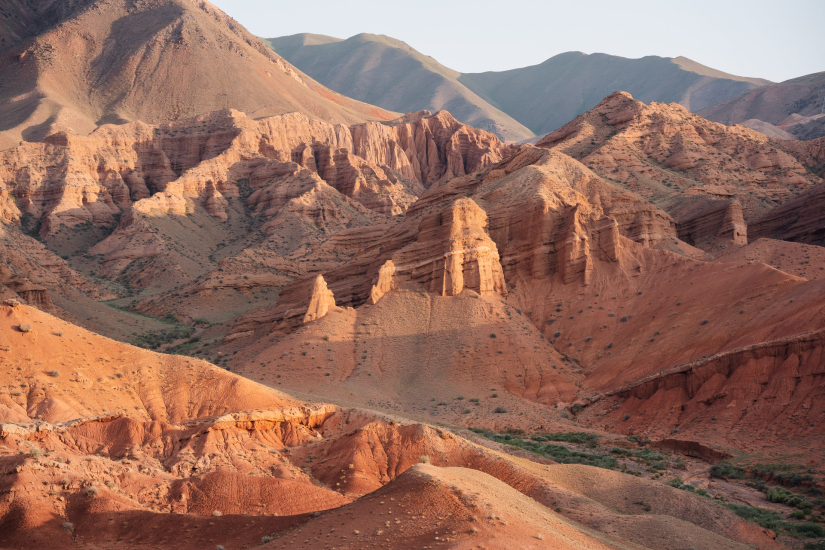
Konorchek, unlike other Kyrgyz canyons, lacks a unifying character and structure. The rocks here are almost randomly structured. In some places there are only ochre-coloured rounded hills, which further on turn into perpendicular and sharply pointed outcrops. In some places, a strong verticality prevails, in others distinct faults. In some places the canyons resemble giant termite mounds. It is this variety and strength of detail that makes Konorchek one of the most beautiful places in Kyrgyzstan.
Jagged canyons of Konorchek
Konorchek, unlike other Kyrgyz canyons, lacks a unifying character and structure. The rocks here are almost randomly structured. In some places there are only ochre-coloured rounded hills, which further on turn into perpendicular and sharply pointed outcrops. In some places, a strong verticality prevails, in others distinct faults. In some places the canyons resemble giant termite mounds. It is this variety and strength of detail that makes Konorchek one of the most beautiful places in Kyrgyzstan.
- Camera used: SONY ILCE-7C
- Exposure time: 1/50 s
- Aperture: f/8.0
- Focal length: 90mm
- ISO: 100
- Date taken: Jul 3, 2023 01:02:09
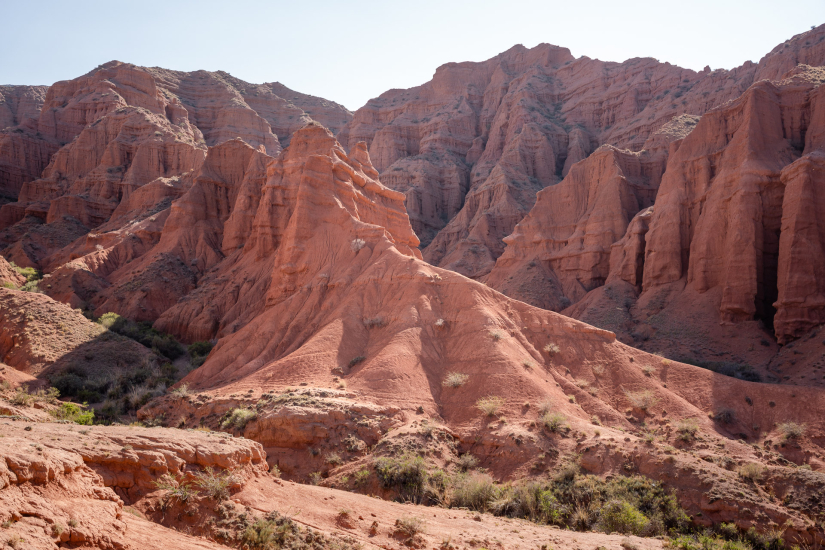
The sharp red rock walls in the jagged canyons of Konorchek look good at almost any time of day. Of course, during sunrise or sunset the rock takes on even redder tones. But even the late afternoon sun can reveal different contours and new views of the canyon. Perhaps it is then that the scorching heat also materializes in photography, in the form of soft shadows.
Konorchek canyons
The sharp red rock walls in the jagged canyons of Konorchek look good at almost any time of day. Of course, during sunrise or sunset the rock takes on even redder tones. But even the late afternoon sun can reveal different contours and new views of the canyon. Perhaps it is then that the scorching heat also materializes in photography, in the form of soft shadows.
- Camera used: SONY ILCE-7C
- Exposure time: 1/125 s
- Aperture: f/8.0
- Focal length: 35mm
- ISO: 100
- Date taken: Jul 2, 2023 12:13:13
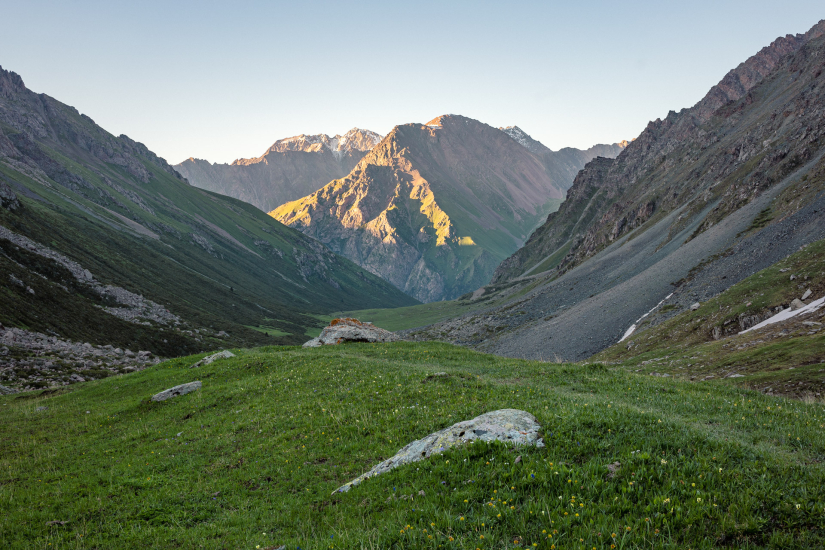
Cool evening on the eastern side of the Teleti pass, roughly in the first places suitable for camping away from the saddle. Although the surroundings are dominated by pleasant mountain meadows, we are at an altitude of about 3500 metres above sea level. Only the highest peaks above the opposite Karakol valley are still being bathed by the last rays of the sun.
Evening under the Teleti pass
Cool evening on the eastern side of the Teleti pass, roughly in the first places suitable for camping away from the saddle. Although the surroundings are dominated by pleasant mountain meadows, we are at an altitude of about 3500 metres above sea level. Only the highest peaks above the opposite Karakol valley are still being bathed by the last rays of the sun.
- Camera used: SONY ILCE-7C
- Exposure time: 1/50 s
- Aperture: f/8.0
- Focal length: 35mm
- ISO: 100
- Date taken: Jun 26, 2023 14:32:35
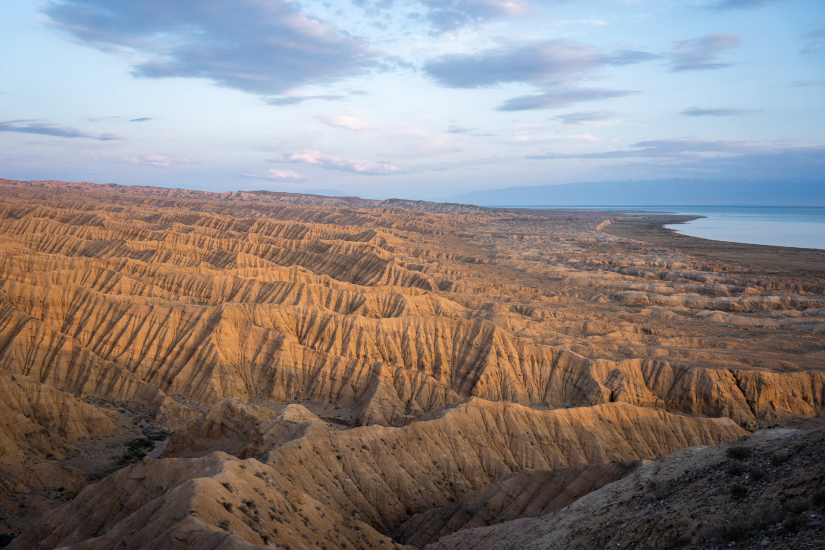
Right from the shores of Lake Issyk Kul, branching canyons rise gently. Perhaps they were formed in the past by many rivers flowing from the glaciated peaks of the Terskey Alatoo mountains. Today, desert conditions reign in the dry riverbeds with occasional prickly bushes growing. The place now known as the 'Canyons of the Forgotten Rivers' could hardly have a more fitting name.
Endless canyons
Right from the shores of Lake Issyk Kul, branching canyons rise gently. Perhaps they were formed in the past by many rivers flowing from the glaciated peaks of the Terskey Alatoo mountains. Today, desert conditions reign in the dry riverbeds with occasional prickly bushes growing. The place now known as the 'Canyons of the Forgotten Rivers' could hardly have a more fitting name.
- Camera used: SONY ILCE-7C
- Exposure time: 1/40 s
- Aperture: f/8.0
- Focal length: 35mm
- ISO: 100
- Date taken: Jul 5, 2023 00:30:35
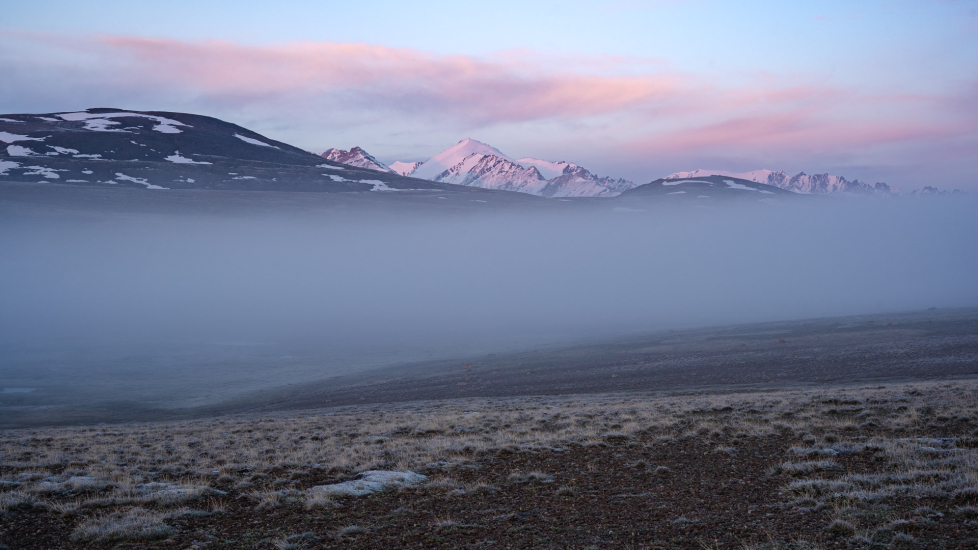
A low band of mist fills the vast plateau full of lakes in the morning. Above the mist, the first rays of the rising sun paint the distant glaciated four thousanders. After an uncomfortable and frosty night, views like this are rewarding.
Ghost mountains
A low band of mist fills the vast plateau full of lakes in the morning. Above the mist, the first rays of the rising sun paint the distant glaciated four thousanders. After an uncomfortable and frosty night, views like this are rewarding.
- Camera used: SONY ILCE-7C
- Exposure time: 1/15 s
- Aperture: f/10.0
- Focal length: 50mm
- ISO: 100
- Date taken: Jul 4, 2023 00:13:14
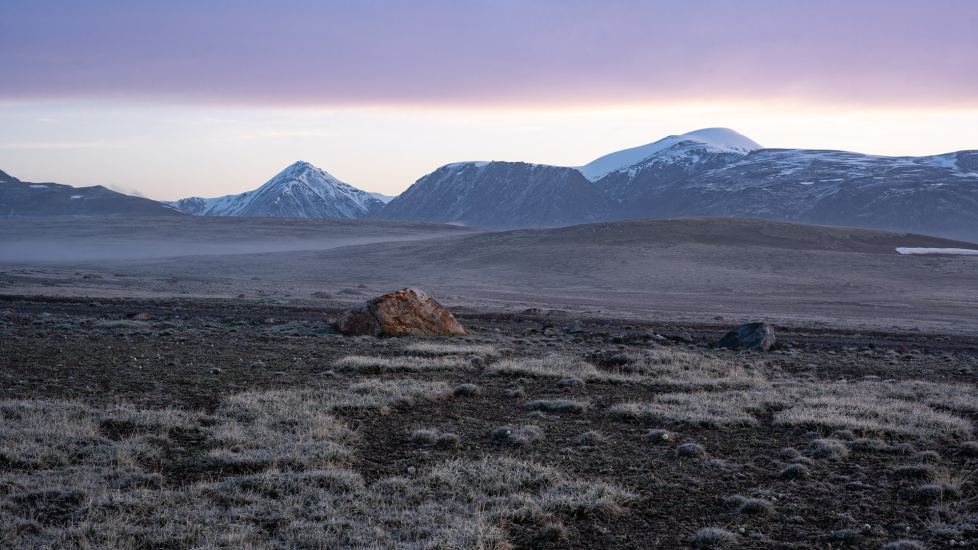
A belt of clouds colours at sunrise over the freshly snow-covered peaks. Although the surrounding landscape is dominated by mountains seemingly without height, we are about 3,800 metres above sea level between the Barskoon and Arabel mountain passes.
Morning in Tian-Shan
A belt of clouds colours at sunrise over the freshly snow-covered peaks. Although the surrounding landscape is dominated by mountains seemingly without height, we are about 3,800 metres above sea level between the Barskoon and Arabel mountain passes.
- Camera used: SONY ILCE-7C
- Exposure time: 1/8 s
- Aperture: f/10.0
- Focal length: 50mm
- ISO: 100
- Date taken: Jul 4, 2023 00:12:50
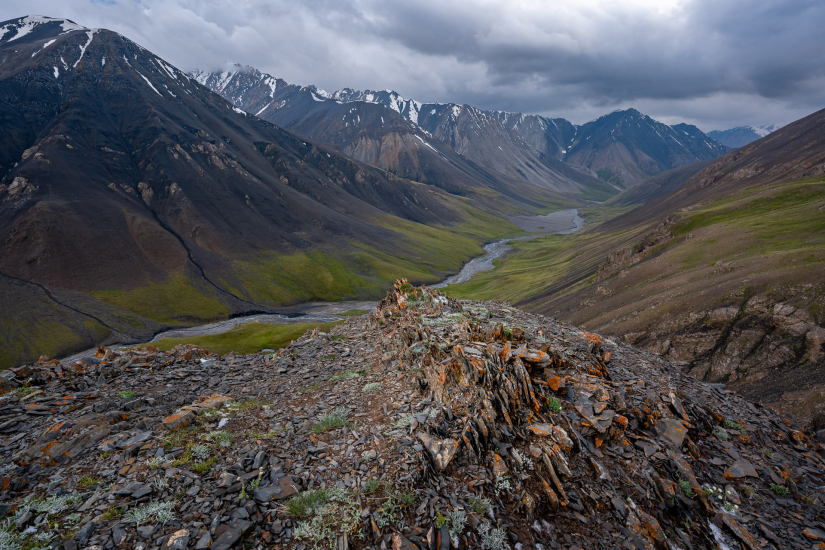
High above the Burkhan valley before the arrival of the snow storm. The green tones in the valley complement the otherwise barren and black-brown coloured slopes topped with glaciers. The landscape is more reminiscent of the volcanic plains of central Iceland, but we are in the middle of the high Tian-Shan.
Burkhan valley
High above the Burkhan valley before the arrival of the snow storm. The green tones in the valley complement the otherwise barren and black-brown coloured slopes topped with glaciers. The landscape is more reminiscent of the volcanic plains of central Iceland, but we are in the middle of the high Tian-Shan.
- Camera used: SONY ILCE-7C
- Exposure time: 1/40 s
- Aperture: f/9.0
- Focal length: 20mm
- ISO: 100
- Date taken: Jul 3, 2023 14:15:59
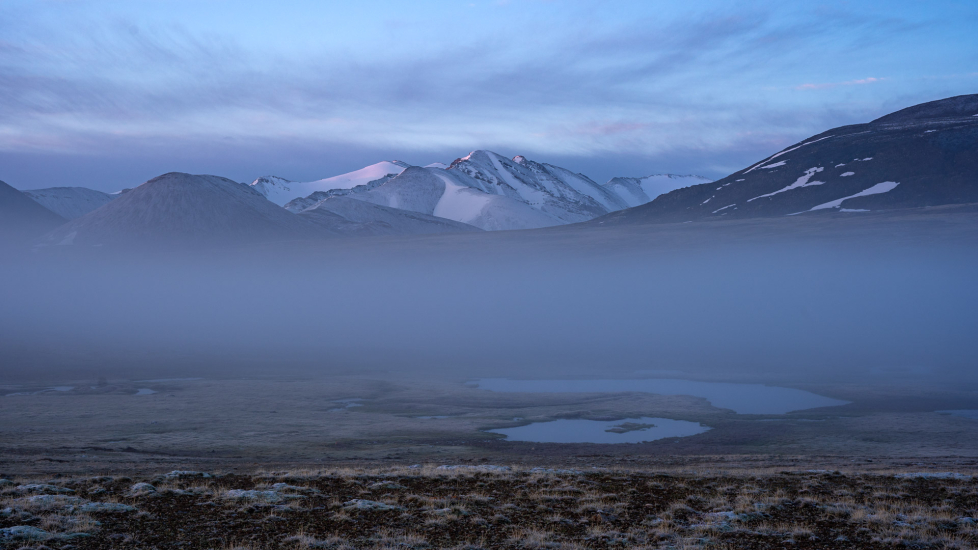
A frosty awakening in the Heavenly Mountains is accompanied by shreds of fog all around. Only the highest peaks, covered with fresh snow, rise above an impenetrable band of creeping cloud. On the stretched plains I look for anything to complete the foreground under the mist. It is only at a group of smaller lakes that I am satisfied; just in time as the surrounding mountains slowly begin to colour with the coming sunrise.
Misty morning int he mountains
A frosty awakening in the Heavenly Mountains is accompanied by shreds of fog all around. Only the highest peaks, covered with fresh snow, rise above an impenetrable band of creeping cloud. On the stretched plains I look for anything to complete the foreground under the mist. It is only at a group of smaller lakes that I am satisfied; just in time as the surrounding mountains slowly begin to colour with the coming sunrise.
- Camera used: SONY ILCE-7C
- Exposure time: 1/20 s
- Aperture: f/8.0
- Focal length: 50mm
- ISO: 100
- Date taken: Jul 4, 2023 00:11:58
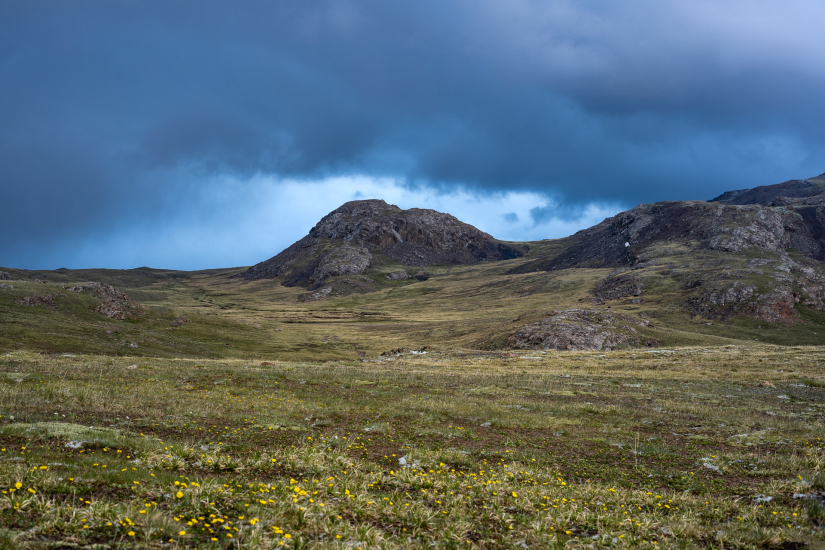
Trapped in the wild mountains of Tian-Shan, we wait for the arrival of a snowstorm at dusk. Just before the whole sky clouds over, a small bright window remains somewhere far above the horizon. The window too disappears quickly, I manage to catch it in a perfect moment over a nearby hill before it disappears completely and the first raindrops fall on the plains.
Snowstorm
Trapped in the wild mountains of Tian-Shan, we wait for the arrival of a snowstorm at dusk. Just before the whole sky clouds over, a small bright window remains somewhere far above the horizon. The window too disappears quickly, I manage to catch it in a perfect moment over a nearby hill before it disappears completely and the first raindrops fall on the plains.
- Camera used: SONY ILCE-7C
- Exposure time: 1/3 s
- Aperture: f/8.0
- Focal length: 50mm
- ISO: 100
- Date taken: Jul 3, 2023 14:52:49
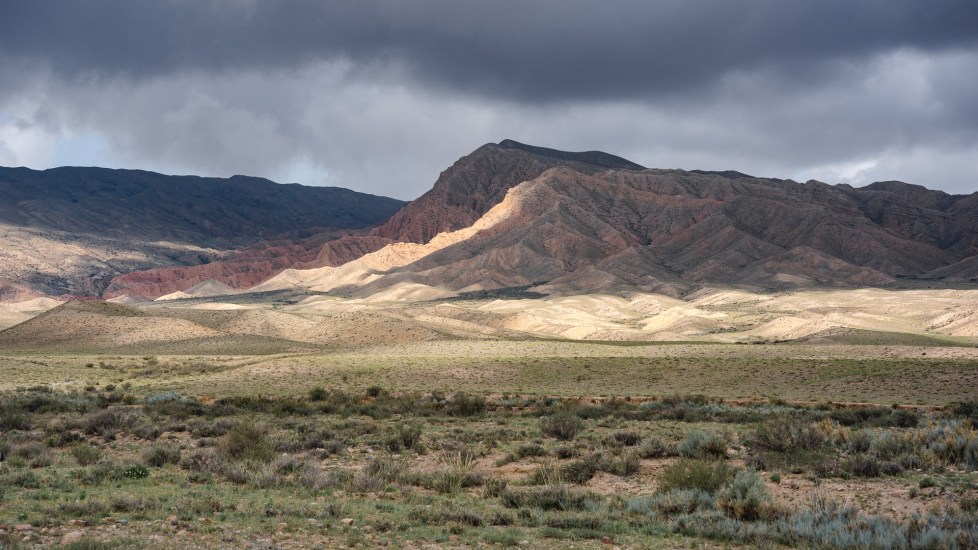
A similar landscape dominates much of central Kyrgyzstan and the area around its largest lake, Issyk Kul. The photographer benefits from the dramatic cloud cover that forms with surprising regularity every day. Clouds pile up over the hills and mountains, dark enough to give the landscape a dramatic feel and thin enough to let in the sun's rays.
Kyrgyz steppes
A similar landscape dominates much of central Kyrgyzstan and the area around its largest lake, Issyk Kul. The photographer benefits from the dramatic cloud cover that forms with surprising regularity every day. Clouds pile up over the hills and mountains, dark enough to give the landscape a dramatic feel and thin enough to let in the sun's rays.
- Camera used: SONY ILCE-7C
- Exposure time: 1/400 s
- Aperture: f/8.0
- Focal length: 90mm
- ISO: 100
- Date taken: Jun 30, 2023 04:12:04
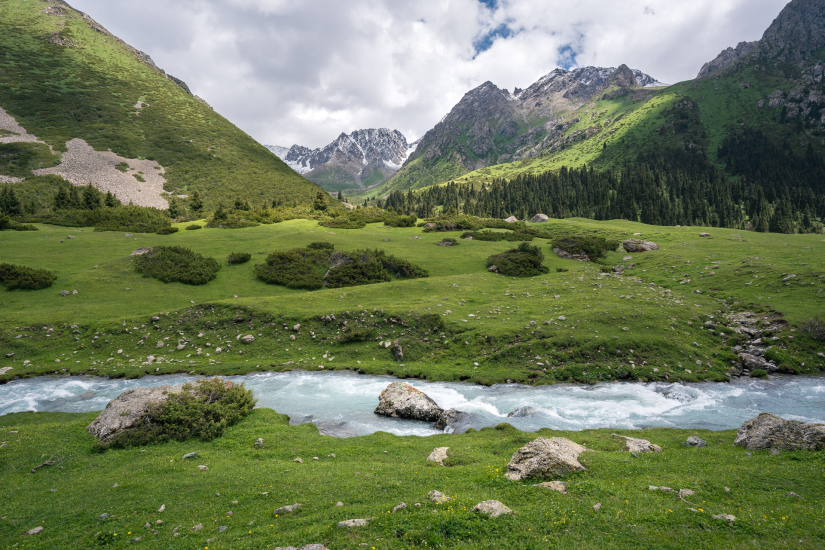
The long and welcoming Teleti valley follows the course of the river of the same name. The wild stream flowing from the glaciers high above the valley flows through green, pleasant meadows and sparse forests. Mountain herbs bloom all around, and herds of semi-wild horses roam the hillsides. A view to the four thousand peaks above the valley's side fold.
In the valley of Teleti
The long and welcoming Teleti valley follows the course of the river of the same name. The wild stream flowing from the glaciers high above the valley flows through green, pleasant meadows and sparse forests. Mountain herbs bloom all around, and herds of semi-wild horses roam the hillsides. A view to the four thousand peaks above the valley's side fold.
- Camera used: SONY ILCE-7C
- Exposure time: 1/400 s
- Aperture: f/8.0
- Focal length: 20mm
- ISO: 100
- Date taken: Jun 26, 2023 06:58:51
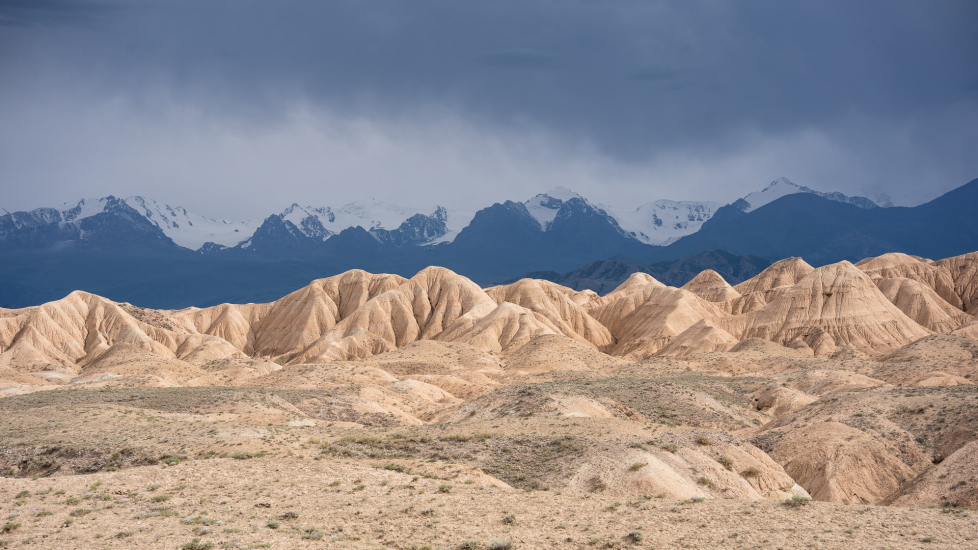
Just off the shores of the vast Lake Issyk Kul, desert canyons rise. The horizon is crowned by the glaciated crest of the Terskey Alatoo mountains, a five thousand meters high side ridge of the Tian Shan. The two extremes, the heat of the sandy hills and the chill of the glaciers up above, create an extraordinary contrast. When conditions are right, the contrast is enhanced by the sun illuminating the canyons and the dark clouds over the mountains.
Shores of Issyk Kulu
Just off the shores of the vast Lake Issyk Kul, desert canyons rise. The horizon is crowned by the glaciated crest of the Terskey Alatoo mountains, a five thousand meters high side ridge of the Tian Shan. The two extremes, the heat of the sandy hills and the chill of the glaciers up above, create an extraordinary contrast. When conditions are right, the contrast is enhanced by the sun illuminating the canyons and the dark clouds over the mountains.
- Camera used: SONY ILCE-7C
- Exposure time: 1/250 s
- Aperture: f/8.0
- Focal length: 90mm
- ISO: 100
- Date taken: Jun 29, 2023 11:59:23